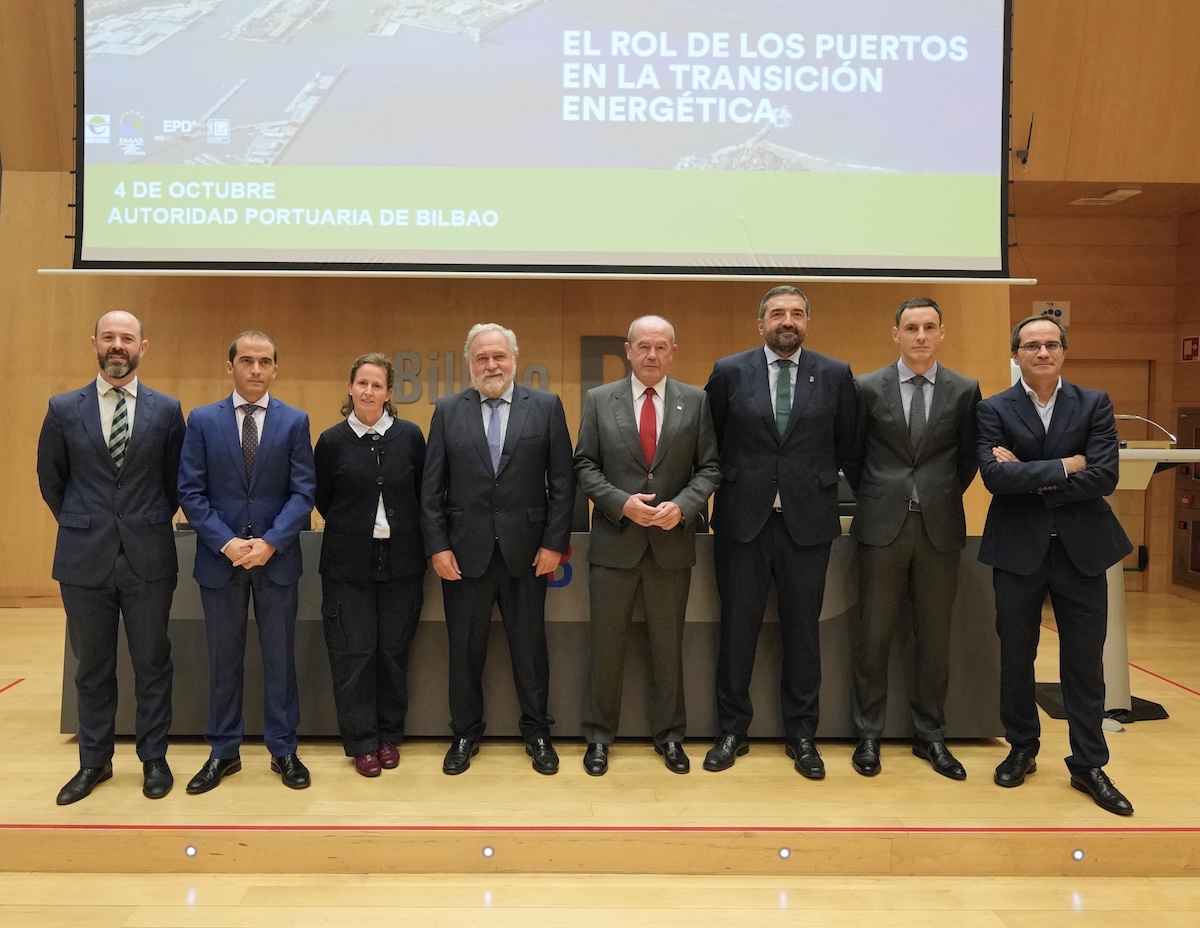Professionals from the port, energy and business sectors took part in a seminar to reflect on the future of ports in terms of sustainability.
The Port of Bilbao has today been the venue for a seminar entitled ‘The role of ports in the energy transition’, organised by the Port Authority of Bilbao and Orkestra – Basque Institute of Competitiveness. The aim of the event has been to outline and analyse the opportunities and challenges facing ports in the context of the energy transition.
In the course of the seminar, a diverse panel of speakers from the port, energy and business sectors have analysed the key issues that ports will have to address as part of the transformation process for future sustainability. They also outlined the main actions being taken in European ports in the field of energy efficiency, decarbonisation and ecological sustainability to adapt to demographic, technological and sustainability changes, factors that are redefining the function of ports and their place in the economic and social fabric of the communities they serve.
The seminar began with a welcome address by Ricardo Barkala, President of the Port Authority of Bilbao, who summed up concisely the need to deliver the energy transition in ports. “Sustainability is a non-negotiable condition for ports. The energy transition, as well as a commitment to our planet and its future, will make us a more competitive port in all senses. We can be competitive by being more sustainable. The two concepts are not contradictory”, he stressed.
Mr. Barkala also highlighted the main strategies being followed by the Port of Bilbao to achieve sustainability, such as the deployment of alternative wind power, the BilbOPS project for the electrification of the docks, the provision of land for the production of synfuels from green hydrogen and CO₂ capture, and the commitment to innovation through Bilbao PortLab.
Macarena Larrea, researcher at Orkestra – Basque Institute of Competitiveness, then presented the main conclusions of the report recently published by Orkestra under the title ‘The role of ports in the energy transition’, a study from which she highlighted that “ports are a strategic partner to meet the main challenges of decarbonisation and sustainability in two main areas: firstly, as drivers of more sustainable maritime transport and port activity through the promotion of more sustainable fuels, the decarbonisation of port activities and the optimisation of port calls, among others; and, secondly, as a link in maritime port clusters, both as a relevant player in the logistic chains and for the development of marine energies, for example”. She also emphasised that “to overcome the challenges facing ports, we must commit to digitalisation and automation, move towards the harmonisation of criteria, ensure fluent communication on an international level, secure stakeholder collaboration, promote R&D&I activities and develop new sources of funding”.
Ms. Larrea was followed by Iñigo Ansola, General Manager of Ente Vasco de la Energía (EVE) – the Basque Energy Agency, who spoke about the Basque energy strategy and the relevance of ports as hubs for marine energy projects. In his intervention, Mr. Ansola congratulated Orkestra and the Port Authority of Bilbao for “the organisation of this event which has a strategic scope for the country, given that ports are of great importance in the creation of wealth and, historically, as drivers of our country. They have a lot to contribute to the new energy reality that we are pursuing: to be economically and environmentally sustainable in a scenario where renewable energies have an ever increasing role, and which offers guarantees of supply without external dependence”.
Carlos Alzaga, General Manager of the Port Authority of Bilbao, then took the floor to outline the projects associated with the energy transition that have already been taken forward in the port to date, and to preview those planned for the near future. Chief amongst those projects are the BilbOPS project for the electrification of the docks and the associated PV installation in the port, an action “which will bring the Port of Bilbao closer to our goal of being a Green Port”. “It is an ambitious and complex project which is already underway, and which will no doubt be very rewarding”, he stressed. “We are providing a new service to shipping companies and, at the same time, contributing to the well-being of society at large. Thanks to this project, part-funded by the EU, in 2025, we will see a reduction in vibration and noise levels and a 40% fall in greenhouse gas emissions”.

José Ignacio Zudaire, Director of People, Organisation, Financial and Institutional Relations of Petronor, then presented the paper ‘The Decarbonisation Hub of Petronor: a pioneering industrial project already underway’. In his intervention, Mr. Zudaire stressed that “the port of Bilbao has always been linked to energy activities, and specifically to the founding of Petronor. This role will continue to be decisive in the future, where having well-communicated facilities, in spaces that are properly equipped to support their development, will be key. In addition to its refining activity, Petronor has important diversification projects in the pipeline, supported by the energy transition where industry and technology go hand in hand”. In this context, Mr. Zudaire pointed out that “in the Basque Country, we cannot and should not perceive the energy transition without it being based on this combination of factors. An energy transition based on security of supply, the environment and price”.
Jorge Fernández, the Coordinator of the Energy and Environment Lab of Orkestra – Basque Institute of Competitiveness, then moderated a round table discussion on the challenges, and the different possible solutions, that the energy transition poses to ports and their future as strategic partners in the decarbonisation of the economy and drivers of more sustainable transport. The participants in the round table were Iñigo Ansola, José Ignacio Zudaire and Andima Ormaetxe, Commercial, Operations and Logistics Director of the Port Authority of Bilbao.
To end the seminar, Ekaitz López, Economic and Financial Director of the Port Authority of Bilbao, rounded up the conclusions of the day’s proceedings.
The International Congress on Sustainable Ports, a new date with sustainability
The International Congress on Sustainable Ports, organised by the Port Authority of Bilbao in collaboration with the Bilbao Chamber of Commerce, will be held on 8 and 9 November at the Euskalduna Conference Centre in Bilbao, with the aim of identifying and publicising the strategies and activities being rolled out in the sector in the field of sustainability.
On the first day, the Congress will address various issues divided into 3 different topic areas: governance and ethics, health and well-being, and climate and energy. On the second day, a round table will be held to examine the relationship between ports and cities, and will feature renowned experts in sustainability such as the Belgian economist Gunter Pauli, considered as “the Steve Jobs of sustainability”; Carola Hein, author of numerous articles on the development of ports and their connection with their environment; and, in collaboration with the Basque Competition Authority, Jan Hoffman, expert in maritime connectivity.
With this initiative, the Port Authority of Bilbao will consolidate its position as a reference organisation in Spain for promoting good practice in sustainability in ports. Likewise, the congress will make the Basque Country a meeting point where public administration, business, the general public and academia will together share their knowledge, experience, techniques and resources for the creation of a common sustainability strategy for the port sector, all within and aligned to the Sustainable Development Goals of the 2030 Agenda.

 Port access
Port access